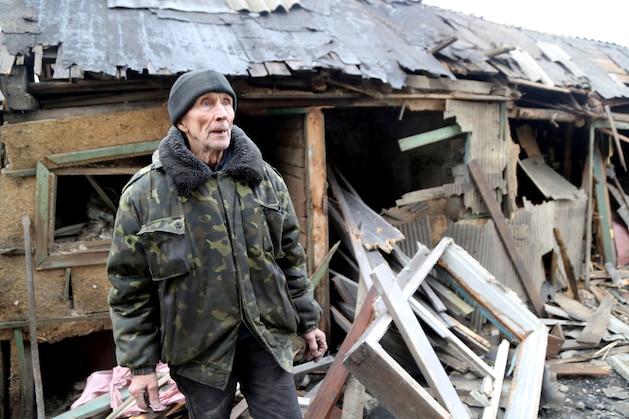Ukraine recaptured the city of Kupyansk. Many locals are pro-Russian and “miss” the occupiers, explains a Ukrainian social worker. But there are also critical voices.
Near Kupyansk, an hour’s drive from the Russian border, Andrei, a Ukrainian social worker, was handing out candy to children when he noticed some of them taking photos with their cellphones.
A soldier explained to him that they are sending these to Russian social media channels and possibly hit squads. On another occasion, he saw villagers refusing to accept help from Ukrainians. “They still miss the Russians,” explains Andrei.
Months after Ukraine recaptured Kupyansk, pro-Russian sentiment in the region is still intact, according to the incumbent mayor, Andrii Besedin.
A third of the city was destroyed by Russian bombardment. Of the 57,000 inhabitants before the war, only 17,000 remain.
Officials believe that some villagers are still relaying information about Ukrainian operations to Russian troops stationed less than 10 kilometers to the east.
Some Ukrainian soldiers report being banned from accepting food from locals for fear of poisoning. Russian propaganda is broadcast into the homes of the population from a radio tower in Belgorod, a town north of the border.
The Ukrainians did not manage to block the signal. “The vast majority of people here were pro-Russian before the war,” says Besedin, and that hasn’t changed much.
Only days after the invasion began, Russian forces entered Kupyansk unopposed. More than 200 of the city council’s 214 employees are believed to have fled to Russia with the mayor.
The Russians created a new radio station, distributed copies of the Russian constitution and Russian magazines, and began publishing their own newspaper, Kharkov Z, which was full of stories about Russia’s heroic campaign to save Ukraine from the “Nazis.” To prevent news from the rest of Ukraine, access to mobile phones, television and the Internet has been blocked.
Not everyone believed the propaganda. The locals our correspondent met mostly sided with Ukraine; many of those who sided with Russia have fled.
One of the locals used Kharkov Z specimens to roll cigarettes, another as a lighter for his stove. Luda Klimovets, a homemaker who takes care of seven dogs, 25 cats and a hedgehog left by their neighbors, says she used them as toilet paper.
Locals who resisted the occupation were often imprisoned or tortured. Vitaliy Sayapin, one of the few officials who refused to side with the Russians, spent more than 100 days in a cell so overcrowded that inmates had to sleep on their feet. The guards forced her to sing the Russian national anthem and Soviet folk songs.
Those who refused were beaten. Electric shocks and mock executions were the order of the day. Between the tortures, the Russians sauntered through the corridors and announced that the Ukrainian leadership had fled. On the Russian day of remembrance, Sajapin recalls, they offered each prisoner two cigarettes.
Many residents have regularly traveled to Russia and have relatives there. But Kupyansk is an exception: in most of the liberated areas, the returning Ukrainian troops were greeted like heroes.
The war of aggression has angered even once pro-Russian Ukrainians. A rocket attack on January 14 that killed at least 40 civilians in the city of Dnipro is just the latest atrocity.
Ultimately, however, Ukraine hopes to retake Crimea and Donbass, regions occupied by the Russians and their proxies since 2014 and historically more Russian-sympathetic. That would mean a battle for the hearts and sanity of the people there.
Russian propaganda “is working with devastating consequences,” Ukrainian President Volodymyr Zelenskyy said in an interview with The Economist in December. It will be a challenge to convince Ukrainians, who have been exposed to this propaganda for nearly a decade.
If you know which devices at home use how much electricity, you can make targeted savings. Our e-paper shows which devices consume how much electricity for all common household appliances, from ovens and hobs to refrigerators and washing machines to TVs and WLAN routers. There are also a number of instant power-saving tips.
Rebuilding is crucial. “We know that Russia is darkness and that Ukraine belongs to the civilized world,” says Besedin, the mayor of Kupyansk, “but people have to see it with their own eyes.”
Authorities have distributed humanitarian supplies and restored electricity and water to over 90 percent of homes, but rebuilding takes longer than blowing them up.
Oleh Synehubov, the head of the military administration in the regional capital Kharkiv, reports that foreign donors have offered Ukrainian books to schools and libraries in the Kupyansk area. “I said that’s a good idea, but we don’t have schools and libraries anymore.”
This text first appeared in The Economist and was translated by Andrea Schleipen.
*The post “Putin bombed their city – but they “still miss the Russians”” is published by The Economist. Contact the person responsible here.








